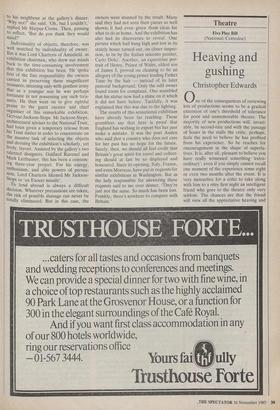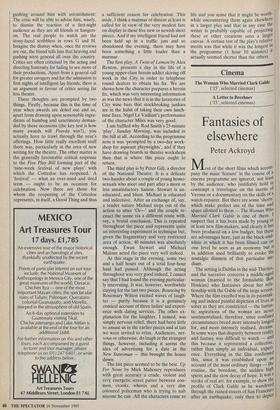Theatre
Five Play Bill (National: Cottesloe)
Heaving and gushing
Christopher Edwards
One of the consequences of reviewing lots of productions seems to be a gradual extension of one's threshold of tolerance for poor and unmemorable theatre. The majority of new productions will, invari- ably, be second-rate and with the passage of hours in the stalls the critic, perhaps, feels the need to believe he has profited from his experience. So he reaches for encouragement in the shape of superla- tives. It is, after all, pleasant to believe you have really witnessed something 'extra- ordinary', even if you simply cannot recall one moment of the experience some eight or even two months after the event. It is very instructive for a critic to take along with him to a ritzy first night an intelligent friend who goes to the theatre only very seldom. The chances are that the friend will view all the appreciative heaving and
gushing around him with astonishment: The critic will be able to advise him, wisely, to dismiss the reaction of a first-night audience as they are all friends or hangers- on. The real people to watch are the stony-faced scribblers in rows G and H. Imagine the dismay when, once the reviews are out, the friend tells him that heaving and gushing were general all over the country. Critics are often criticised by the acting and directing fraternity for failing to see more of their productions. Apart from a general call for greater savagery and for the admission to first nights of intelligent lay friends, there is an argument in favour of critics seeing far less theatre.
These thoughts are prompted by two things. Firstly, because this is the time of year when awards are doled out and so, apart from drawing upon seasonable ingre- dients of humbug and sanctimony deman- ded by these occasions (the key test is how many awards will Pravda win?), you actually have to trawl through the year's offerings. How little really excellent stuff there was, particularly in the area of new writing for the theatre. The other matter is the generally favourable critical response to the Five Play Bill forming part of the `nine-week festival of new plays' with which the Cottesloe has reopened. A `festival' — what an over-used and tired term — ought to be an occasion for celebration. Now there are those for whom the reopening of the Cottesloe represents, in itself, a Good Thing and thus
a sufficient reason for celebration. This aside, I think a murmur of dissent at least is called for in view of the very modest fare on display in these five new or newish short pieces. And if my intelligent friend had not been held up in a traffic jam and so abandoned the evening, there may have been something a little louder than a murmur.
The first play, A Twist of Lemon by Alex Renton, presents a day in the life of a young upper-class heroin addict skiving off work in the City in order to telephone round dealers to obtain his fix. We are shown how the character prepares a heroin fix, which was very interesting information as was the news that it is in the lavatories of City wine bars that stockbroking junkies are in the habit of taking their own lunch- time fixes. Nigel Le Vaillant's performance of the character Miles was very good.
I am baffled why Rod Smith's 25-minute `play', Sunday Morning, was included in the bill at all. According to the programme note it was 'prompted by a two-day work- shop for aspirant playwrights', and if they have drawing boards in theatre workshops then that is where this piece ought to return.
The third play is by Peter Gill, a director of the National Theatre. It is a delicate two-hander about a couple of young homo- sexuals who meet and part after a more or less unsatisfactory liaison. Stewart is un- educated, and blunt. Michael is educated and indecisive. After an exchange of, say, a tender nature Michael steps out of the action to utter 'Or—' and the couple re- enact the scene via a different route with, say, a brutal conclusion. This is repeated throughout the piece and represents quite an interesting experiment in technique but, given the fragmentary and very restricted area of action, 40 minutes was absolutely enough. Ewan Stewart and Michael Malone acted the piece very well indeed.
At this stage in the evening, some two and a half hours out of a total four-hour haul had passed. Although the acting throughout was very good indeed, I cannot say'that I had found the evening particular- ly interesting. It was, however, worthwhile staying for the last two pieces. Bouncing by Rosemary Wilton excited waves of laugh- ter — partly because it is a genuinely comical account of three ladies' sad experi- ence with dating services. The other ex- planation for the laughter, I sensed, was simply nervous relief; there had been little to amuse us in the earlier pieces and at last we were invited to relax. Audiences, ner- vous or otherwise, do laugh at the strangest things, however, including it seems the idea of advertising for a date in the New Statesman — this brought the house down.
The last piece seemed to be the best. Up For None by Mick Mahoney reproduces with great accuracy a crude, violent and very energetic street patter between con- men, crooks, whores and a very dim coloured policeman who is trying to nab anyone he can. All the characters come to
life and you sense that it might be worth- while encountering them again elsewhere in a larger play and that in any case the writer is probably capable of projecting these or other creations onto a larger canvas. A certain test of the play's relative merits was that while it was the longest In the programme (1 hour 10 minutes) it actually seemed shorter than the others.



































































 Previous page
Previous page